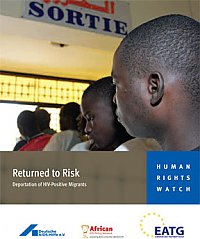At least 31 countries still deport people living with HIV, according to a survey of 197 countries conducted by Deutsche AIDS-Hilfe and Human Rights Watch reported on Tuesday, July 20, at the XVIII International AIDS Conference in Vienna.
According to Peter Weissner of Deutsch AIDS-Hilfe, a Germany-based HIV education and advocacy organization, who presented the survey results in Vienna, the actual number of countries deporting migrants with HIV is not precisely known because of the absence of a universal system of reporting and monitoring.
 | |
| Cover image from “Returned to Risk: Deportation of HIV-Positive Migrants,” a 2009 report by Human Rights Watch. |
In 2007, Deutsche AIDS-Hilfe developed a questionnaire on HIV-related restrictions on entry, stay and residence, including questions on deportation. With support of the German Ministry for Foreign Affairs, the questionnaire was sent to German embassies of 197 countries.
Human Rights Watch conducted its own survey of deportation of HIV-positive migrants in five countries.
Of the countries surveyed, 31 said they deported people living with HIV. In alphabetical order, these countries are Armenia, Bahrain, Bangladesh, Brunei, Egypt, Equatorial Guinea, Hungary, India, Iraq, Jordan, Kazakhstain, Korea (North and South), Kuwait, Malaysia, Moldova, Mongolia, Oman, Panama, Qatar, Russia, Saudi Arabia, Singapore, Solomon Islands, Sri Lanka, Syria, Taiwan, Turkmenistan, United Arab Emirates, Uzbekistan and Yemen.
An additional 66 countries listed some restrictions, Weissner reported. Twenty-five countries surveyed provided contradictory information, and eight countries didn’t provide any information. Of the 197 surveyed, 119 did not have any migrant restrictions.
Weissner also provided specific examples of deportation practices. In Egypt, for example, 722 HIV-positive foreigners were detected between 1986 and 2006—all of whom have been deported (90 percent were Africans). In South Korea, 521 of 546 HIV-positive foreigners were forced to leave. And in the Russian Federation, 1,579 legal migrants tested positive for HIV in 2008, and 198 of them were deported.
In Saudi Arabia and the United Arab Emirates, there is a high number of mostly Asian migrant workers, all of whom are subjected to mandatory HIV testing. If HIV test results are found to be positive, migrants face detention in prison-like hospital cells for up to one year without treatment. “Many HIV-positive people die while waiting deportation,” Weissner said. In 2008, he added, 1,518 people living with HIV, hepatitis B and tuberculosis were deported from the United Arab Emirates alone.
“Governments have inconsistent policies regarding equitable and non-discriminatory access to HIV treatment and largely fail to ensure linkage to treatment when people living with HIV are deported,” Weissner and his colleagues reported.
“The deportation of people living with HIV based on HIV status itself has no public health justification, and policies that support it are discriminatory and threaten lives,” the authors add. “At the global level it endangers the goal for universal access.”
As for next steps, Weissner said that further research and advocacy are needed and that better recording systems should be put in place. Most important, national governments should reconsider deportation policies for people living with HIV. Migrants should also be provided with a core minimum of health services—including antiretroviral therapy—without discrimination on the basis of citizenship.
More information is available at hivrestrictions.org and hrw.org/en/topic/health/hiv/tb.






1 Comment
1 Comment